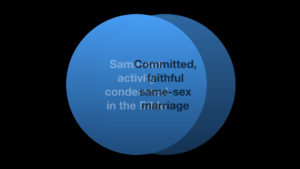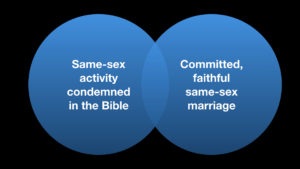This video explains why Sodom has nothing to do with the debate about the Bible and homosexuality. Sodom is an account of attempted gang rape – and, like the similar account of a gang rape of a woman in Judges 19, it has nothing to do with committed, faithful, loving relationships of any kind.
Transcript
The sin of Sodom was homosexuality. You’ve heard this? It’s wrong. Keep watching to find out why.
Some people argue that the story of Sodom and Gomorrah in the Bible shows that God condemns all homosexuality. Here’s a quick recap of that story – it comes from Genesis 18 and 19.
The story of Sodom
Two angels are sent by God to the city of Sodom, known for its wickedness. Lot, Abraham’s nephew, lives there. He welcomes the angels, and offers them hospitality, persuading them to stay for the night. They accept, and he lays on a lavish feast for them.
But word gets out, and all the men of the town surround the house, and demand that the visitors be brought out so that they can rape them (translations often translate the Hebrew literally – ‘so that we may know them’ – that’s just a euphemism for intercourse).
[Note – Scott Morschauser (amongst others) has argued against this interpretation, proposing that the sin of Sodom was abandonment of the rule of law, and that the men of Sodom wanted to ascertain the reason for the strangers coming to the city (and so nothing to do with sexual aggression). This approach remains a minority view amongst scholarship.
Morschauser, Scott. “‘Hospitality’, Hostiles and Hostages: On the Legal Background to Genesis 19.1-9.” Journal for the Study of the Old Testament 27, no. 4 (2003): 461-85.]
Now, Lot tries to protect his visitors, even offering his own daughters in their place – that is problematic for other reasons – but the mob become enraged and they try to attack.
The angels blind the mob, and then drag Lot and his family away from the city, and God destroys the cities of Sodom and Gomorrah by fire. Lot’s wife looks back and is turned into a pillar of salt. Only Lot and his daughters escape with their lives.
It’s a dramatic account, and Sodom becomes a by-word for an evil city. But what, in the Bible, is Sodom remembered for?
How does the Bible talk about Sodom?
Well, Isaiah compares the nation of Judah to Sodom and Gomorrah, saying that Judah needs to learn to do good; to seek justice, to rescue the oppressed, to defend the orphan, to plead for the widow. And elsewhere there is judgment upon Judah for being like Sodom – why? – because they are ‘grinding the faces of the poor’.
Ezekiel says: This was the guilt of your sister Sodom: she and her daughters had pride, excess of food, and prosperous ease, but did not aid the poor and the needy. They were haughty, and did abominable things before me; therefore I removed them when I saw it.
Elsewhere, it’s the fate of Sodom which is emphasised – watch out, or you’ll end up worse than Sodom and Gomorrah!
So a range of accusations, centring around:
- injustice,
- oppressing the poor, and
- doing abominable things.
Analysing the story
Let’s go back to the account. At the heart of it is a grotesque evil – abominable. It’s the attempted gang rape by an enraged mob. Is it same-sex? Yes. But rape isn’t to do with sex or gender – it’s to do with power and attempted control and humiliation.
In Britain, Jimmy Savile left a trail of both male and female survivors of his abuse. In Iraq, the Abu Ghraib prison became notorious for the assaults inflicted upon both female and male prisoners – assaults including rape. This was an attempted gang rape. What has that got to do with committed, loving relationships?
Parallels with Judges 19
But if you think the gender matters, there’s a similar account in Judges 19. A man and his concubine enter a city and are offered hospitality. The men of the city come at night demanding that he be thrown out to them to be raped. The concubine is offered instead – and she is raped and killed.
[For a harrowing exegesis of this episode, see in particular:
Phyllis Trible, Texts of Terror, new ed. (London: SCM Press, 2002), 45-66.]
Same-sex rape; heterosexual rape; rape is rape. It’s about violence, and it has nothing to do with any kind of loving relationships.
Conclusion
In an earlier video, I argued that we need to consider whether, when the Bible talks about same-sex activities, these are similar to or different from committed, faithful, loving same-sex relationships.


What happened in Sodom was a million miles away from any type of loving relationship, whether same-sex or not.
Sodom has got nothing to offer in the debate about the Bible and homosexuality.
This is part of a series of videos looking at the Bible and homosexuality. If that interests you, subscribe to the channel. And if you want to find out a bit more, you can go to the companion website, bibleandhomosexuality.org.
The next passages that usually come up are the verses in Leviticus 18 & 20 – you can read more about them here.
Found this helpful? You can now get the material from this website and more in a book. Affirmative: Why You Can Say Yes to the Bible and Yes to LGBTQI+ People is available at Amazon and other major retailers. You can find out some more about the book here.
Resources
First of all, here is a list of occurrences of Sodom in the Bible (including deuterocanonical books) after its destruction in Gen. 19:
Deut 29:23; Deut 32:32
Isa 1:9; Isa 1:10; Isa 3:9; Isa 13:19
Jer 23:14; Jer 49:18; Jer 50:40
Lam 4:6
Ezek 16:46; Ezek 16:48; Ezek 16:49; Ezek 16:53; Ezek 16:55; Ezek 16:56
Amos 4:11
Zeph 2:9
3 Macc 2:5
2 Esd 2:8; 2 Esd 7:106
Matt 10:15; Matt 11:23; Matt 11:24
Luke 10:12; Luke 17:29
Rom 9:29
2 Pet 2:6
Jude 7
Rev 11:8
A note on Jude 7
The text of Jude 6-7 says (NRSV translation):
And the angels who did not keep their own position, but left their proper dwelling, he has kept in eternal chains in deepest darkness for the judgment of the great Day. Likewise, Sodom and Gomorrah and the surrounding cities, which, in the same manner as they, indulged in sexual immorality [ekporneusasai] and pursued unnatural lust [sarkos heteras], serve as an example by undergoing a punishment of eternal fire.
Sarkos heteras is more literally translated as ‘other flesh’. What might this mean?
First, note that it is a strange construction if the primary referent is homosexuality – that is not pursuing other flesh.
Secondly, note that Sodom and Gomorrah sinned ‘in the same manner’ as angels who did not keep their own station.
Jude appears to be referring to the sin of humans and angels (who could be described as being of other flesh from humans) having (or attempting to have) intercourse together. Both Gen. 6:1-4 and Gen. 19 can be understood this way.
What makes this interpretation the most plausible is that Jude is working with the same ideas as the Jewish apocryphal book of Enoch, which includes an account of the fall from heaven of 200 angels who take human wives – an elaboration of Gen. 6:1-4 (Enoch 6).
As the angels fell because of their lust for women, so the Sodomites desired sexual relations with angels. sarkos heteras, “strange flesh”, cannot… refer to homosexual practice… it must mean the flesh of angels.
Bauckham, Richard J. Jude, 2 Peter, Word Biblical Commentary vol. 50. (Waco, Texas: Word, Incorporated, 1983), 54
The author’s point here is not that the male inhabitants of Sodom sought to have sex with male visitors, but that they sought relations with angelic beings of an entirely different order.
Kraftchick, Steven J. Jude 2 Peter, Abingdon New Testament Commentaries, (Nashville: Abingdon Press, 2002), 39.
To summarise: Jude 7 condemns Sodom and Gomorrah for attempting to have intercourse with angels, just as angels were condemned for having intercourse with humans.
A note on hospitality
One dimension I have not raised in the video is that Sodom’s sin is a violation of hospitality. Hospitality was a key virtue in the Ancient Near East culture to an extent often unrecognised in the West.
Sodom should have welcomed Lot, and in turn welcomed his visitors. Instead they tried to gang-rape both the visitors and Lot (note in particular Gen. 19:9 – Lot is singled out as an alien).
This failure of hospitality may lie behind passages such as Luke 10:12 – it is in the context of a town’s inhospitality to the seventy that Jesus sends out that a comparison with Sodom is made.
Support helplines and websites (UK)
NHS Choices – Help after rape and sexual assault
Help after rape and sexual assault
Rape Crisis
Helpline: 0808 802 9999 (12-2:30 and 7-9:30)
National organisation offering support and counselling for those affected (female and male) by rape and sexual abuse.
Sexual Abuse Referral Centres – Find a SARC
SARCs are specialist medical and forensic services for anyone who has been raped or sexually assaulted. They aim to be one-stop service, providing the following under one roof: medical care and forensic examination following assault/rape and, in some locations, sexual health services. Medical Services are free of charge and provided to women, men, young people and children.


